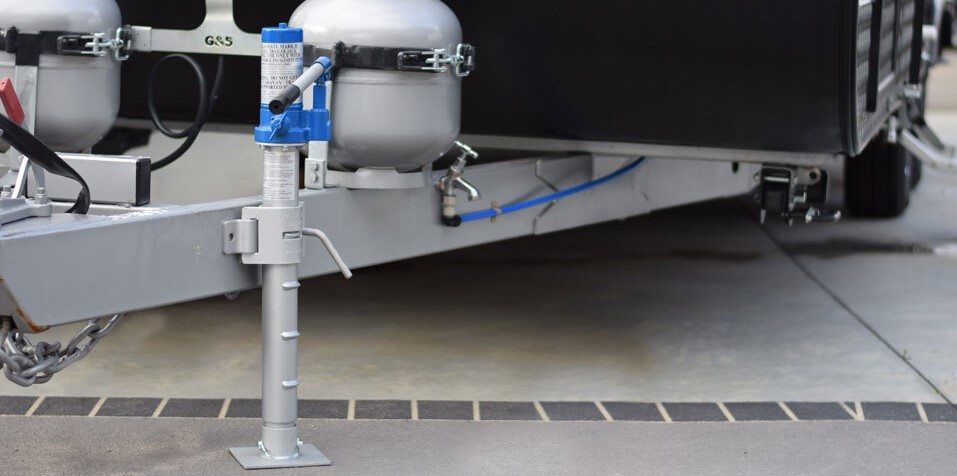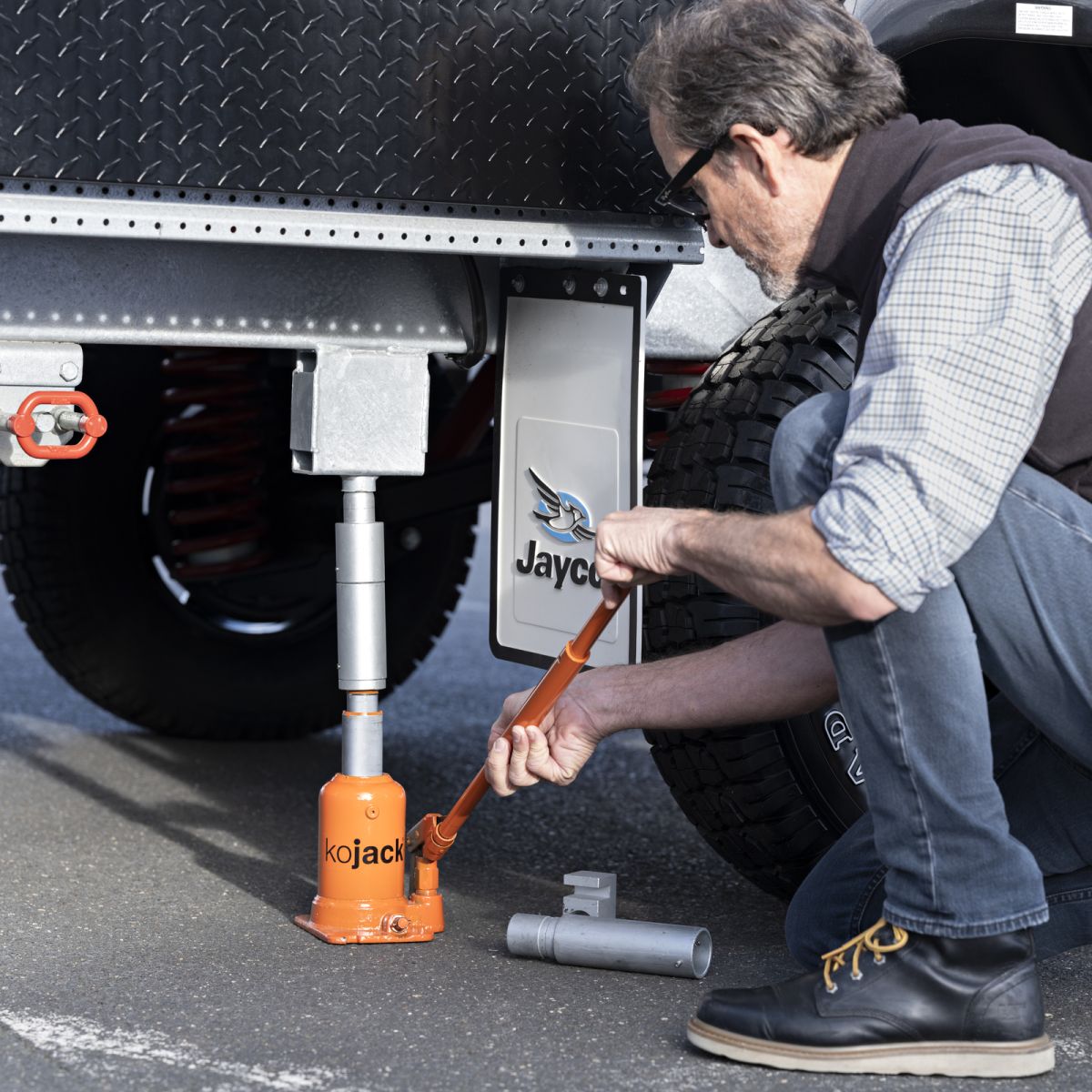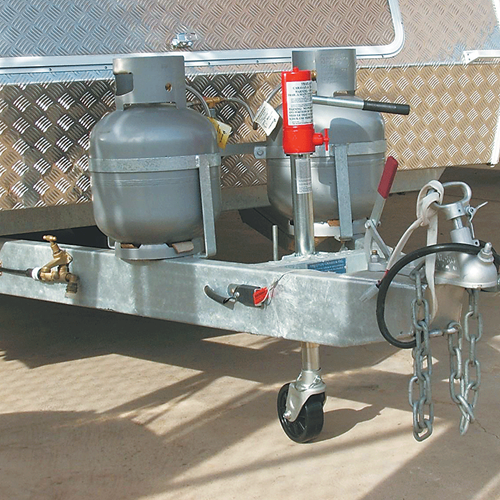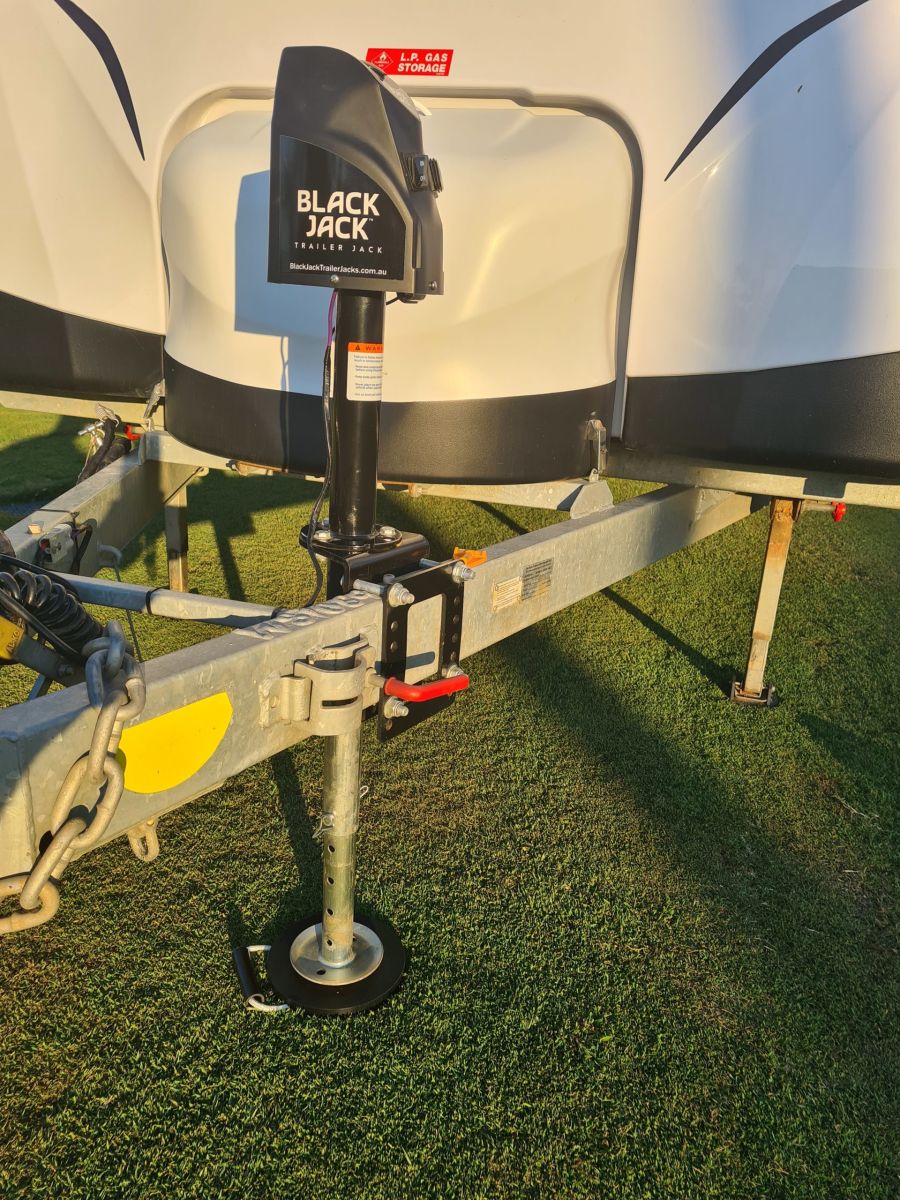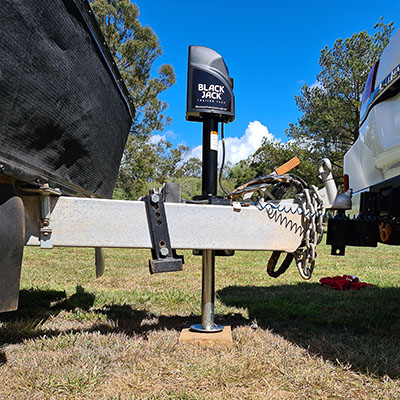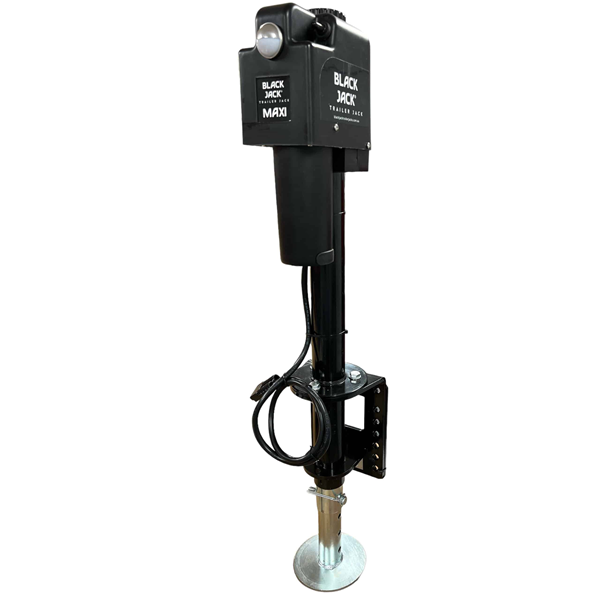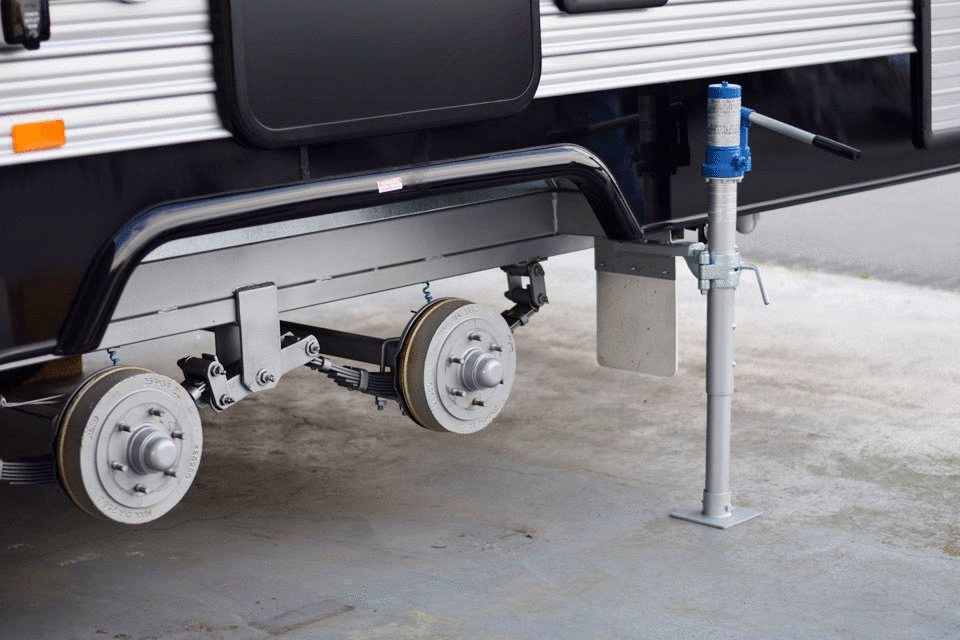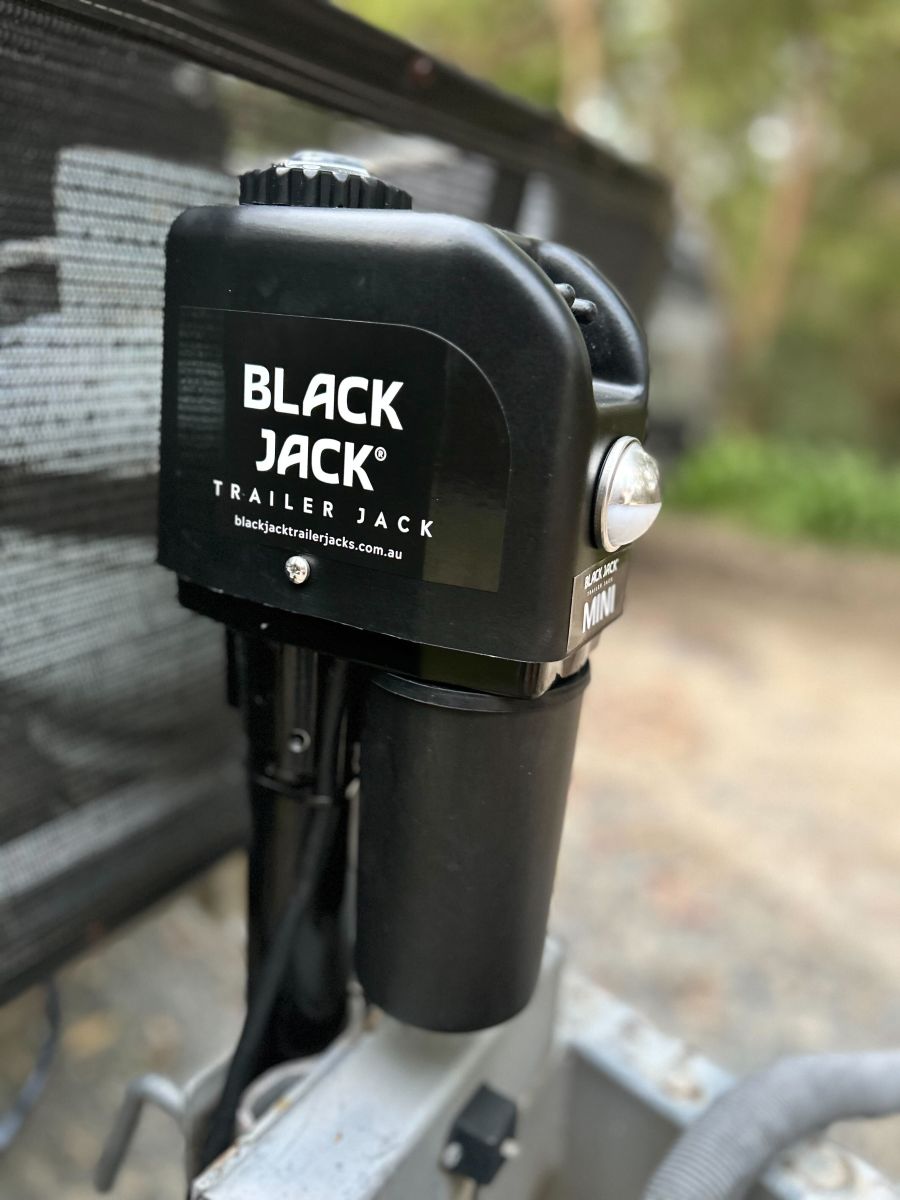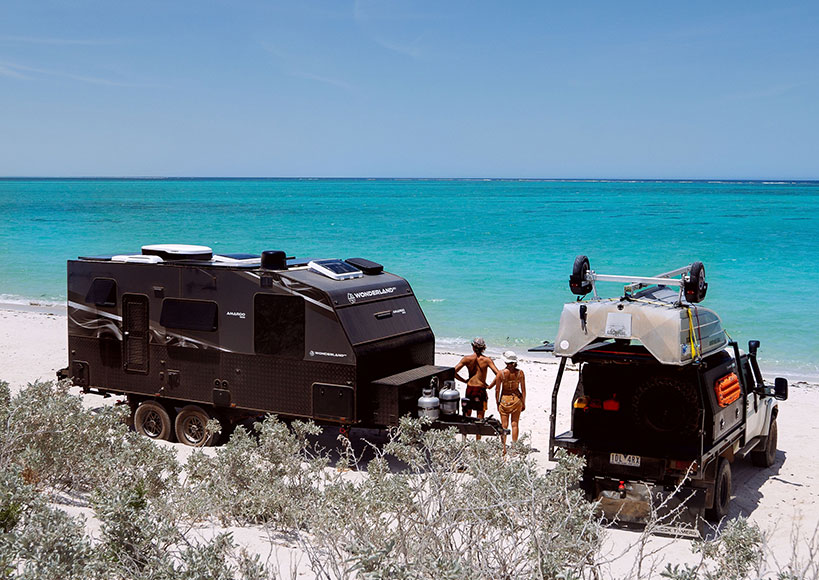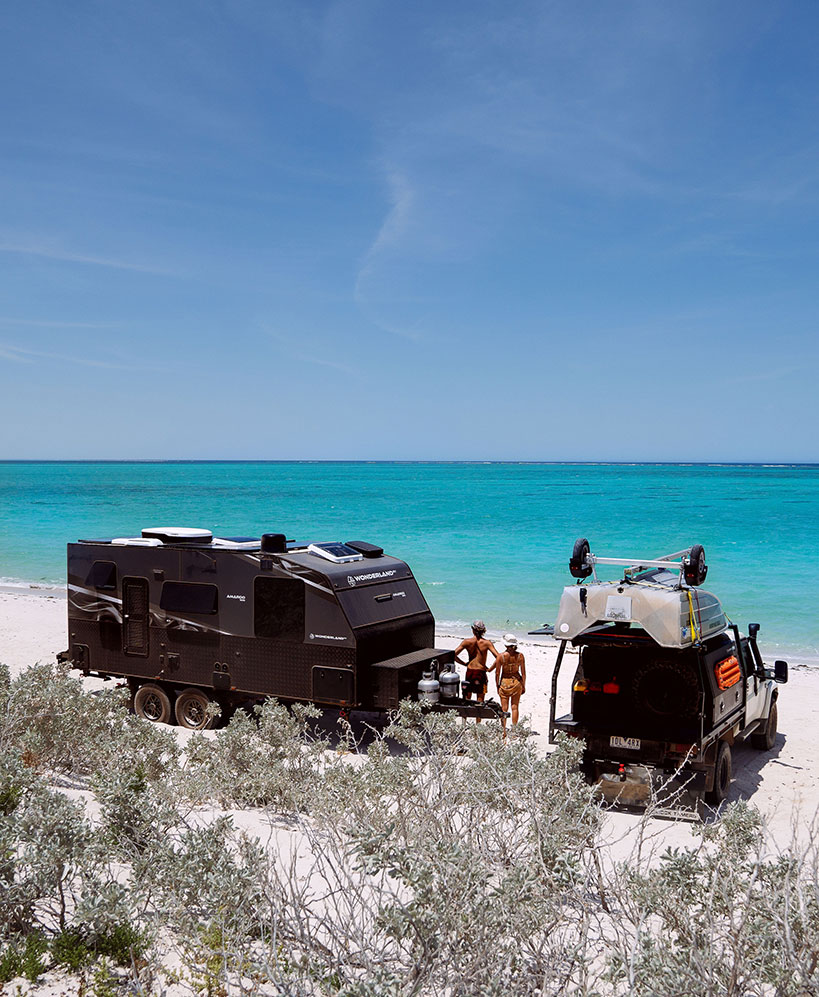A caravan jack is a must-have for caravanners. But without the right jack, lifting your caravan safely can become a risky challenge. That’s why choosing the best caravan jack isn’t just about convenience - it’s about safety, stability, and ensuring your travels go smoothly. And while a quality jack is essential for lifting and levelling, pairing it with the right jockey wheel can further enhance your setup’s maneuverability and ease of use - check out our full guide to caravan jockey wheels here.
A variety of Caravan Jack options exist in Australia, each designed to suit different needs. Caravan jacks can be manual, hydraulic, or electric, each suited to different tasks and power sources. While electric jacks typically require a 12V power source, which can come from caravan house batteries or an Anderson plug from your tow vehicle.Whether you need a robust off-road caravan jack for rugged terrains or caravan stabilising jacks to keep your setup steady, this guide will help you navigate the options.
Understanding Caravan Weight and Capacity Requirements
When selecting the right caravan jack for your setup, understanding your caravan’s weight is essential for both caravan jack safety and performance. Using a jack with insufficient capacity can lead to serious hazards, while an overpowered jack may be unnecessary and costly. This section will break down the key weight measurements you need to consider, how to determine them, and how to choose a caravan jack that meets your caravan’s requirements while complying with Australian standard caravan jacks regulations.
Critical Caravan Weight Measurements
To ensure you choose the best caravan jacks, you need to understand three key weight measurements:
Tare Mass (Empty Caravan Weight)
Tare mass refers to the weight of your caravan when it’s completely empty, without passengers, luggage, or water in the tanks. This is the manufacturer’s stated base weight of the caravan when it leaves the factory. Tare mass is essential because it provides a baseline for calculating how much load your caravan can handle.
Gross Trailer Mass (GTM) – Fully Loaded Weight
The GTM is the total weight of the caravan when fully loaded, including water, gas bottles, luggage, and accessories. This is the most crucial number when choosing a caravan jack because it tells you the maximum weight your jack may need to lift. For off-road caravan jacks, which often deal with rough terrain, selecting a jack with an even higher weight capacity is recommended.
Tow Ball Weight (TBW)
Tow ball weight is the portion of the caravan’s weight that rests on the tow vehicle’s hitch. This is important when using electric trailer jacks for hitching and unhitching, as they must support this weight. A poorly balanced tow ball weight can lead to unstable towing and increased stress on both your vehicle and caravan.
How to Determine These Weights for Your Caravan
Accurately determining your caravan’s weight is essential to choosing the right caravan jack. Here’s how you can measure these weights:
-
Check the compliance plate: Most caravans have a compliance plate (usually near the door or on the drawbar) that lists the tare mass and GTM.
-
Use a weighbridge: A public weighbridge is the most accurate way to measure the weight of your fully loaded caravan. Simply weigh your caravan when empty and again when fully loaded to get your tare and GTM figures.
-
Calculate tow ball weight: Place your caravan’s tow hitch on a tow ball scale to measure the downward force applied to the vehicle’s hitch.
Once you have these figures, you can confidently select a caravan jack that can safely lift your caravan when needed.
Matching Jack Capacity to Caravan Weight Requirements
A hydraulic caravan jack, electric trailer jack, or any other type of lifting jack must be rated to handle your caravan’s weight. Here's how to calculate you jack capacity for caravan jacks. Calculate ¼ of the loaded ATM (Aggregate Trailer Mass). Most jacks on the market have a capacity of at least 1000kg, sufficient for the majority of standard caravans.
Here’s what to consider:
-
The jack must have a lifting capacity greater than your caravan’s GTM. Most caravan jacks are rated in kilograms, so ensure your jack can handle at least your GTM.
-
If you’re using caravan stabilising jacks, remember that these are meant for support, not lifting. They should not be relied on to bear the full weight of the caravan.
-
Off-road caravan jacks require a higher weight capacity to account for uneven terrain and potential sudden weight shifts.
Safety Margins and Why They Matter
A common mistake is choosing a caravan jack that just meets the weight requirement without leaving a safety margin. Ideally, your jack should have at least 20-30% more capacity than the weight you need to lift.
For example, if your caravan has a GTM of 2,000 kg, selecting a jack rated for exactly 2,000 kg is risky. Instead, opt for a hydraulic caravan jack or electric trailer jack with a capacity of at least 2,500 kg to ensure safe and stable lifting.
Why does this matter?
-
Weight fluctuations: If you load more gear, fill your water tanks, or add accessories, your caravan’s weight may exceed its original GTM.
-
Uneven weight distribution: Lifting a caravan on an incline or soft ground can shift weight unexpectedly, requiring a higher capacity jack.
-
Jack longevity: Using a jack at its maximum limit repeatedly can wear it out faster, reducing its reliability.
Types of Caravan Jacks
Electric Jacks
Electric jacks are becoming increasingly popular among caravan owners due to their convenience and ease of use. Unlike manual jacks that require physical effort, electric trailer jacks use a motorised system to lift and lower the caravan with the push of a button. Key benefits include:
-
Reduced Physical Strain – No need for hand-cranking, making it ideal for older caravanners or those with mobility issues.
-
Speed and Efficiency – Lifts the caravan quickly, saving time when hitching or unhitching.
-
Precision Control – Allows for smooth, controlled lifting without abrupt movements.
Power Requirements and Installation Considerations
Most electric trailer jacks run on a 12V power system, drawing energy from the caravan’s battery. Some models come with a manual override function in case of battery failure. Installation typically involves bolting the jack onto the A-frame of the caravan and connecting it to the power supply.
Popular Models
-
Black Jack Electric Trailer Jack – A top choice in Australia, featuring a 12V motor, built-in LED light for nighttime operation, and a 1600kg lift capacity. There are typically designed just for hitching and unhitching and not for tyre changing etc. Multiple Black Jack sizes available in the market now to suit multiple applications. The Black Jack Mini is a great option if your A-Frame is crowded and the clamp won’t fit. It uses the existing jockey wheel mount for installation.
Hydraulic Jacks
Hydraulic caravan jacks use pressurised fluid to generate force, allowing for smooth and powerful lifting with minimal effort. Compared to manual jacks, they provide superior stability and control, making them a preferred option for heavier caravans. Primarily for tyre changes and general maintenance.
-
Increased Lifting Power – Capable of lifting heavier loads than most manual jacks.
-
Smooth Operation – Hydraulic mechanisms prevent sudden drops or instability.
-
Durability – Fewer moving parts mean longer-lasting reliability.
Manual vs. Powered Hydraulic Jacks
-
Manual Hydraulic Jacks – Require pumping action to build hydraulic pressure, providing precise control but requiring some effort.
-
Powered Hydraulic Jacks – Utilize an external power source or compressor, reducing manual effort significantly.
Popular Models
-
Kojack Hydraulic Jack – A heavy-duty, 4-tonne capacity jack with a stable base, ideal for large caravans.
-
Trail-A-Mate – A premium hydraulic caravan jack that doubles as a jockey wheel, making it a versatile 2-in-1 solution.
Manual Jacks
Manual jacks are the most traditional and widely used caravan jacks. They come in different styles, each suited to a specific function:
Scissor Jacks – Common for caravan Stabilising; provide support but not ideal for heavy lifting.
Stabilising Jacks – Designed to keep a caravan level rather than lift it off the ground.
Bottle Jacks – Compact and powerful, ideal for lifting one side of a caravan during maintenance.
Benefits of Manual Jacks
-
No Power Needed – Fully mechanical operation makes them reliable in remote areas.
-
Lightweight and Portable – Easier to store and transport.
-
Affordable and Durable – Less expensive than hydraulic or electric jacks, with fewer components that can fail.
Primary Functions of Caravan Jacks
Caravan jacks serve multiple purposes beyond just lifting a caravan. Whether you’re hitching up for a road trip, changing a tyre in the middle of the outback, or ensuring your caravan remains stable when parked, choosing the right jack is essential for safety and efficiency.
Hitching and Unhitching
One of the most common uses of a caravan jack is raising and lowering the caravan’s A-frame to connect or disconnect it from the tow vehicle. The right electric trailer jack or hydraulic caravan jack can make this process much smoother and safer.
To ensure a safe hitching and unhitching process, your caravan jack should:
-
Have a sufficient lift range – It should be able to raise the A-frame high enough to clear the tow ball.
-
Offer stability – A wider base or adjustable footplate prevents tilting or sinking on soft ground.
-
Be easy to operate – Whether manual, hydraulic, or electric, it should provide smooth operation.
-
Comply with AS/NZS 2693:2007 – Ensuring it meets Australian standard caravan jacks regulations.
Using The Caravan Jack Safely
-
Park on level ground – Engage the handbrake on both the tow vehicle and caravan before proceeding.
-
Use wheel chocks – Even on flat terrain, placing chocks behind the wheels prevents accidental movement.
-
Raise the caravan gradually – Using an electric trailer jack or hydraulic caravan jack, lift the A-frame until the tow ball clears the hitch receiver.
-
Check for alignment – Before hitching, ensure the caravan and vehicle are properly aligned to avoid sudden weight shifts.
-
Lower carefully – Once the tow ball is properly positioned, lower the caravan slowly and lock the hitch in place.
Recommended Models
-
Black Jack Electric Trailer Jack – An excellent electric trailer jack that allows effortless raising and lowering of the caravan at the push of a button.
-
Trail-A-Mate Hydraulic Jack – A high-quality hydraulic caravan jack that provides smooth and stable lifting.
Tyre Changes
Getting a flat tyre while towing is inconvenient and potentially dangerous. A properly rated caravan jack ensures you can safely lift your caravan and replace a tyre with minimal effort.
Not all caravan jacks are suitable for changing tyres. To safely lift your caravan:
-
Use designated jacking points – These are reinforced areas on the caravan chassis, designed to handle the weight.
-
Ensure your jack matches your caravan’s weight – Choose a hydraulic caravan jack or bottle jack with a capacity exceeding your caravan’s GTM.
-
Opt for a jack with a broad base – This prevents sinking on soft or uneven surfaces, especially for off-road caravan jacks.
Changing Caravan Tyres Safely
-
Park on solid, level ground – Avoid soft sand or unstable surfaces.
-
Engage the handbrake and use chocks – Secure the opposite wheel to prevent movement.
-
Loosen the wheel nuts before lifting – This prevents the wheel from spinning while in the air.
-
Position the jack correctly – Place it under the designated jacking point and lift gradually.
-
Remove and replace the tyre carefully – Once secured, lower the caravan slowly before fully tightening the nuts.
Recommended Models and Accessories
-
Kojack Hydraulic Jack (4-tonne capacity) – A strong and stable hydraulic caravan jack designed for tyre changes.
-
Trail-A-Mate Hydraulic Jack – Functions as both a jockey wheel and hydraulic caravan jack, making it a versatile choice.
-
RedFoot Levelling Pads – Essential accessories for stability on uneven terrain.
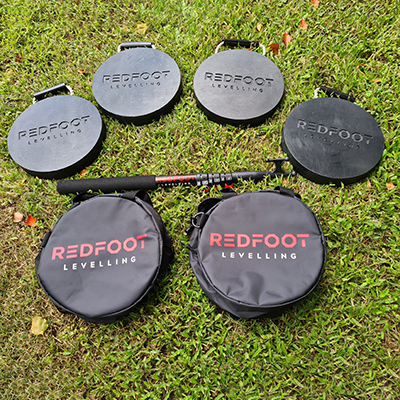
Stabilisation and Leveling
A caravan stabilising jack is not designed for lifting but rather for keeping the caravan steady when parked. Ensuring proper stabilisation enhances comfort and prevents movement inside the caravan.
-
Prevent rocking and swaying – Stabiliser jacks reduce movement caused by walking inside the caravan.
-
Enhance safety – A properly stabilized caravan is less likely to shift on sloped or uneven ground.
-
Protect the chassis – Uneven weight distribution can put stress on certain points, leading to long-term damage.
Integration with Leveling Systems
For the best results, stabiliser jacks should be used in combination with a leveling system:
-
Use leveling ramps or blocks first – Raise one side of the caravan if needed before deploying the jacks.
-
Extend Stabilising jacks to the ground – Adjust them until they just make contact without lifting the caravan.
-
Fine-tune for even weight distribution – Make small adjustments to ensure stability across all four corners.
Best Practices for Different Terrains
-
Soft ground – Use jack pads to distribute weight and prevent sinking.
-
Uneven surfaces – Adjustable Stabiliser jacks help compensate for sloped terrain.
-
Rocky areas – Ensure jacks make full contact with solid ground to avoid slipping.
Recommended Stabilising Jacks
-
Drop-down Stabiliser Legs – Common on modern caravans, providing quick and easy leveling.
-
Off-road Caravan Jacks – Heavy-duty stabilisers designed for rugged environments.
Top Caravan Jacks In Australia
Black Jack Electric Trailer Jack Range
Black Jack are the most popular caravan hitching jack on the market. The Maxi and Mini Black Jack trailer jacks offer a solution for those larger off road rigs or the smaller occasional caravaner.
The Black Jack Maxi boast a whopping 2000lb lift capacity, ball bearing worm drive for quieter faster lifting, intelli brake motor and 4.5m lifting stroke for those high caravan and lifted tow vehicles.
The Black Jack Mini jack aids in the hitching for caravans that have little room on their A-frame. The mini still boasts a strong 1000kg lifting capacity and can be mounted into your existing jockey wheel bracket.
Installation Requirements
The Black Jack MAXI Electric Trailer Jack runs on 12V power, drawing energy from the caravan’s battery. Installation involves:
-
Bolting the jack onto the A-frame – The 58mm post fits most standard caravan A-frames.
-
Connecting to the power supply – Requires basic wiring to the caravan’s battery.
-
Ensuring a solid ground connection – Poor grounding can affect motor efficiency.
A top seller is the Black Jack Electric Maxi trailer jack with clamp harness kit.
This trailer jack is a simple, quiet and advanced electric jack designed for a huge 2000kg lifting capacity - more than enough muscle to lift popular caravan models! It’s also built for the toughest conditions and includes a built-in level indicator so you can easily adjust the caravan level. Other highlights include the removable footpad extension, emergency crank handle and LED night light in case you’re operating in the dark.
Kojack High Lift Hydraulic Caravan Jack
Detailed Specifications
-
Lifting Capacity: 4 tonnes
-
Lifting Range: 750mm with extension pieces
-
Carry Bag
Performance in Various Conditions
-
On solid ground: Excellent stability due to its broad base and hydraulic control.
-
On uneven terrain: Performs well when paired with jack pads to prevent sinking.
-
In wet conditions: Rubberized base prevents slipping.
If you are looking for something with even more muscle, check out the Kojack Caravan Jack - it’s rated to 4 tonnes! If you need to unhitch or change a tyre, the Kojack makes it easy. It even comes with multiple jacking point adapters to suit your van.
Trail-A-Mate Hydraulic Jack
The Trail-A-Mate is unique because it functions as both:
-
A jockey wheel for maneuvering your caravan.
-
A hydraulic caravan jack for lifting when required.
This is specifically designed for use with a caravan and makes light work of hitching and unhitching - no matter how low your caravan or camper trailer might be. Want to turn the jockey wheel into a jack? All you need to do is remove the pin and replace the wheel with a base plate and adjustable clamp.
Weight Capacity and Limitations
-
Lifting Capacity: 1.5 tonnes
-
Jockey Wheel Rating: Supports standard caravan A-frame sizes
-
Limitations: Heavier than a standard jockey wheel, requiring secure mounting.
Need to lift your caravan out of a sticky situation? An exhaust jack, aka air bag jack, could help. Connect the jack to the exhaust pipe to inflate and help lift your vehicle out of sand, mud, snow or soft ground, where other jacks might sink, so you can slip some tracks under the wheels and drive out.
It also helps where the vehicle is too low for any other jack to fit, as the deflated air bag jack can slip underneath smaller spaces.
The great thing about the exhaust jack is there are no moving metal parts that can go wrong. It can be packed away in a small space, which makes it easy to store and bring out when you need it. However, it can NOT be used for hitching.
The following table below highlights the key specifications of three popular Australian standard caravan jacks to help you compare their features at a glance.
|
Feature |
Black Jack Electric Maxi Trailer Jack |
Kojack Hydraulic Caravan Jack |
Trail-A-Mate Hydraulic Jack |
|
Jack Type |
Electric Trailer Jack |
Hydraulic Bottle Jack |
Hydraulic Jockey Wheel & Jack |
|
Lifting Capacity |
2000kg |
4 tonnes |
1.5 tonnes |
|
Lifting Range |
450mm |
750mm |
385mm |
|
Power Source |
12V Battery |
Manual Hydraulic Pump |
Manual Hydraulic Pump |
|
Weight |
~17kg |
~12kg |
~15kg |
|
Base Plate Type |
Standard Round Footplate |
Wide Anti-Slip Base |
Jockey Wheel & Jack Footplate |
|
Best Use Case |
Hitching & Unhitching |
Heavy Caravan Lifting |
Multipurpose Use |
Buying Considerations
Matching Your Jack to Your Caravan's Weight:
-
For lightweight caravans (under 2 tonnes), a scissor jack or a basic hydraulic caravan jack may be sufficient.
-
For mid-range caravans (2-3 tonnes), a Kojack Hydraulic Jack or Trail-A-Mate provides better lifting power.
-
For heavy-duty caravans (3+ tonnes), a high-capacity hydraulic caravan jack for tyre repair or a heavy-duty electric trailer jack like the Black Jack Electric Jack Maxi is recommended for hitching.
Electric vs. Manual Jacks:
For those who prefer convenience, an electric trailer jack such as the Black Jack Electric Mini Trailer Jack requires minimal physical exertion and operates with the push of a button. However, electric models rely on a 12V power source, making them less suitable for off-grid locations.
Hydraulic caravan jacks, such as the Kojack or Trail-A-Mate, offer a balance between ease of use and reliability. They require a pumping action to lift the caravan but provide smoother and more controlled lifting than manual options.
Traditional manual jacks, including scissor jacks and bottle jacks, are compact and do not require power, making them a budget-friendly choice. However, they can be physically demanding, particularly for larger caravans.
Tip: If you have mobility concerns or struggle with manual lifting, an electric trailer jack or hydraulic caravan jack is the best choice.
Compatibility with Your Specific Caravan Model
Not all caravan jacks are compatible with every caravan. Before purchasing, it is essential to check whether the jack will fit securely onto the A-frame or designated jacking points of your caravan. Some caravans have specific reinforced jacking points that require a particular type of jack, such as AL-KO chassis-compatible models like the Kojack Hydraulic Jack.
Ground clearance is another important factor, as some jacks may not function effectively with low-profile caravans. Checking your caravan manufacturer’s recommendations ensures that you select a jack that fits correctly and operates safely.
Durability and Weather Resistance
Australia’s harsh climate requires caravan jacks that can withstand extreme temperatures, dust, and moisture. Some jacks with plastic components may degrade faster in high-heat conditions, while metal jacks that lack corrosion protection may rust over time.
To ensure longevity, look for powder-coated or galvanised finishes that resist rust and corrosion. If using a caravan jack for off-road use, select one with a wide, stable base to prevent it from sinking into soft ground.
Warranty and After-Sales Support
A quality caravan jack should come with a warranty that provides peace of mind in case of defects or failures. Budget models often include a one-year warranty, while premium options such as the Black Jack Electric Trailer Jack or Trail-A-Mate Hydraulic Jack typically offer warranties of two to five years.
Additionally, it is beneficial to purchase a jack from a brand that provides local Australian support and spare parts availability. Brands like Trail-A-Mate and Black Jack offer after-sales service, making it easier to replace components if needed.
Installing Caravan Jacks
Manual Jacks
Manual jacks, such as scissor jacks or bottle jacks, are typically easy to install and operate without requiring power. However, they do require careful placement to ensure stability.
-
Positioning: Ensure the jack is placed on a flat, firm surface with sufficient clearance to operate.
-
Securing the Jack: When using a scissor or bottle jack, ensure it is properly aligned with the jacking point (usually the A-frame of the caravan). The jack should be centered to prevent tilting or shifting during operation.
-
Safety Check: Before use, double-check that the jack is securely in place and that the caravan is not at risk of rolling. If possible, chock the wheels to prevent movement.
Hydraulic Jacks
Hydraulic caravan jacks, such as the Kojack and Trail-A-Mate, require a more precise setup to ensure they work effectively.
-
Placement: Position the jack in the appropriate jacking point on the A-frame or chassis. For jacks with a large base, such as the Trail-A-Mate, make sure the surface is stable and level to prevent sinking.
-
Connections: For some hydraulic models, such as the Trail-A-Mate, you may need to attach the pumping handle or ensure the hydraulic fluid levels are correct before use.
-
Stability: Hydraulic jacks are highly stable once in position, but it’s still important to ensure that the weight distribution is even before lifting the caravan.
Electric Jacks
Electric jacks, like the Black Jack Electric Trailer Jack, require an electrical connection, typically a 12V power source.
-
Mounting: Mount the electric jack securely on the A-frame or the drawbar using the manufacturer’s provided mounting hardware. The jack should be firmly attached to prevent any wobbling during use. The Black Jack Mini offers mounting directly to the existing jockey wheel clamp. Ensure bracket compatibility with caravan drawbar diameter when upgrading to electric models.
-
Power Connection: Attach the jack to your caravan’s 12V power socket, which may require wiring if not already equipped. Ensure the wiring is secure, and there is no risk of interference or wear.
-
Testing: Before use, perform a quick test to ensure the jack operates smoothly. Check for any faulty wiring or loose connections that could impact performance.
Caravan Jacks FAQs
-
1. Can I use a car jack for my caravan?
Using a car jack for your caravan is not recommended. Car jacks are typically designed for much lighter vehicles, such as passenger cars, and may not have the necessary weight capacity or stability to safely lift a caravan.
-
2. How much weight can my caravan jack handle?
The weight capacity of a caravan jack depends on the model and type. Each jack is rated for a maximum weight load that it can safely lift. This is typically referred to as the Working Load Limit (WLL). For example, a common hydraulic jack might have a capacity of 2,000 to 4,000 kg, which is suitable for most caravans. It's essential to choose a jack that is rated for a weight higher than your gross trailer mass (GTM) to ensure it can handle the load. Always check the jack's weight rating before use and ensure it meets or exceeds the weight of your caravan to maintain safety.
-
3. Can I upgrade my manual jack to an electric system?
Yes, it is possible to upgrade your manual jack to an electric jack if your caravan has the necessary power supply and installation space. Electric jacks, such as the Black Jack Electric Trailer Jack, are ideal for reducing physical strain, especially for those with mobility issues or for frequent use. To upgrade, you’ll need to ensure that:
Your caravan’s electrical system can support the additional load of the electric jack (most require a 12V power supply).
There is sufficient space on the A-frame to install the electric jack securely.
You have the correct mounting hardware and wiring connections. Many electric jack kits come with installation instructions for easy upgrade, but if you're not comfortable with electrical work, consider seeking professional installation.
-
4. How do I know if my jack needs servicing?
Your caravan jack should be inspected regularly for signs of wear and tear. If you notice any of the following, it's time to consider servicing or replacing your jack:
Stiff operation: If the jack is difficult to raise or lower, this may indicate internal damage or a lack of lubrication.
Leaks: For hydraulic jacks, check for signs of fluid leaks around the seals. Leaks may indicate a need for seal replacement or re-filling hydraulic fluid.
Unstable or uneven lifting: If the jack lifts unevenly or seems unstable, it may be a sign of damaged components or misalignment.
Rust or corrosion: If you notice significant rust, especially around the lifting mechanism or base, this can compromise the jack’s strength.
Visible cracks or deformation: Any physical damage to the body or components of the jack should be inspected by a professional.
Let’s Wrap Up
Summary of Key Points
-
Types of Jacks: There are three primary types of jacks for caravans—manual, hydraulic, and electric—each suited to different needs. Manual jacks are budget-friendly and reliable but require physical effort. Hydraulic jacks offer greater lifting power and stability, ideal for heavy caravans. Electric jacks provide convenience and ease of use, particularly for those with mobility concerns or for frequent use.
-
Weight Capacity: Always ensure the jack you choose can handle the weight of your caravan. Pay attention to the working load limit (WLL) and gross trailer mass (GTM) to prevent overloading and potential jack failure.
-
Durability and Weather Resistance: Given Australia’s harsh conditions, rust-resistant finishes, such as powder-coating or galvanizing, are essential. If you're using the jack off-road, choose models with wide, stable bases to avoid sinking in soft ground.
-
Safety: Never compromise on safety. Follow manufacturer guidelines for correct placement of the jack, always check the lifting capacity, and ensure the ground is level and firm. Regular inspection and servicing of your jack are critical for maintaining performance.
Choosing the right caravan jack is essential for ensuring the safety and convenience of your caravanning experience. Throughout this guide, we've explored the different types of jacks- manual, hydraulic, and electric - as well as key considerations such as weight capacity, installation, and durability. We’ve also emphasized the importance of safety, understanding jacking points, and selecting a model that complies with Australian standards for reliability and performance.
We offer a wide selection of high-quality caravan jacks suited for every type of caravanner. Whether you’re after a manual jack, a hydraulic jack, or an electric model, you’ll find options that meet Australian safety standards and are built to last. Browse our caravan jack collection today or contact us with any questions on 1800 787 278.
-
DISCLAIMER* Please note, this advice is general in nature and we strongly recommend consulting the product manual and where relevant, a professional installer.
Comments (2)
Trailermate 2 comment query
I fail to understand the logic of requiring a 1500kg rated jockey wheel. At no point in time should the draw bar be imposing a load of more than 350kgBy: Brian Hickey on 05 February 2024
www.caravanrvcamping.com.au Response
The durability of the jockey wheel is crucial for its long-term performance. By selecting a jockey wheel rated for 1500kg, manufacturers ensure that it can withstand frequent usage, varying environmental conditions, and potential wear and tear over time. Using a lower-rated jockey wheel might result in premature failure or degradation, leading to additional maintenance costs or safety hazards down the line. Using the van on uneven terrain may also momentarily increase the load on the jockey wheel as well. Using a heavier rated jockey wheel adds a layer of safety.

